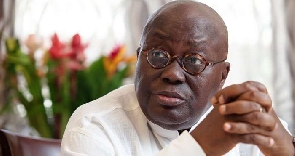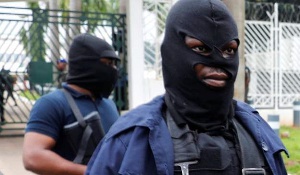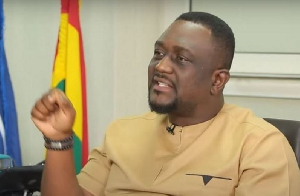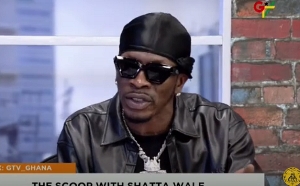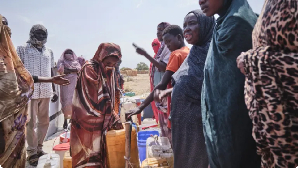We woke up a few days ago to be greeted by yet another news of corruption scandal in the erstwhile NDC administration, this time, alleged oil money of GH40.5 million surreptitious transfers to the presidency, via the then Chief of Staff (See: ‘Group explains why Amidu must probe Mahama, Debrah in GH¢40.5m BOST payment’; myjoyonline.com/ghanaweb.com, 19/09/2018).
In fact, I have always maintained that a fantastically corrupt public servant is no less a human rights abuser than the weirdo Adolf Hitler.
This is because while the enigmatic Adolf Hitler went into a conniption-fit and barbarically exterminated innocent people with lethal chemicals and sophisticated weapons, a contemporary corrupt public servant is blissfully bent on suffocating innocent citizens through wanton bribery and corruption.
Consequently, the innocent citizens would often end up facing untold economic hardships, starvation, depression, emotional labour and squalor which send them to their early graves.
It would, however, appear that the political criminals have the licence to steal. And if that was not the case, how come the offending politicians and their accomplices often go scot free?
Since the birth of Ghana’s Fourth Republic (from 1993 to present), the nation has regrettably lost billions of dollars meant for developmental projects through unbridled sleazes and corruption, and yet the methods employed by the successive governments in combating the apparent canker have been extremely disappointing, so to speak.
Dearest reader, tell me, if the rampant bribery and corruption, dubious judgment debt payments, stashing of national funds by some greedy opportunists , misappropriation of resources and crude embezzlement of funds meant for developmental projects by some public officials do not warrant criminal charges, then where are we heading as a nation?
Elsewhere, though, the laws and regulations are strictly enforced, and as such the vast majority of the citizens and denizens prefer the observance to the stringent fines and the harsh punishments.
In a grand scheme of things, the prevention and eradication of corruption should be a collaborative effort amongst governments and other interested parties to cooperate with one another with the support and involvement of groups outside the government such as civil society, non-governmental organisations and community-based organisations.
If, indeed, the prevention and eradication of corruption is a synergistic venture, why is it then that the successive governments and their Attorney Generals had woefully failed to cooperate with other interested parties to investigate, prosecute and retrieve the stolen monies from the impenitent nation wreckers?
"When public money is stolen for private gain, it means fewer resources to build schools, hospitals, roads and water treatment facilities.
“When foreign aid is diverted into private bank accounts, major infrastructure projects come to a halt. Corruption enables fake or substandard medicines to be dumped on the market, and hazardous waste to be dumped in landfill sites and in oceans. The vulnerable suffer first and worst (Ban Ki-moon, 2009)."
Corruption, to be quite honest, impedes economic development by distorting markets and collapsing private sector integrity.
“Corruption also strikes at the heart of democracy by corroding rule of law, democratic institutions and public trust in leaders. For the poor, women and minorities, corruption means even less access to jobs, justice or any fair and equal opportunity” (UNDP 2016).
There is no denying the fact that the revoltingly cyclical corrupt practices amongst the political elites have resulted in underdevelopment, excessive public spending, less efficient tax system , needless high public deficit and destabilization of national budgets, heightened capital flight and the creation of perverse incentives that stimulate income-seeking rather than productive activities.
It goes without saying that corruption is a global phenomenon which requires a collaborative effort to prevent and eradicate.
It was against that backdrop that in its resolution 55/61 of 4 December 2000, the UN General Assembly recognized that an effective international legal instrument against corruption, independent of the United Nations Convention against Transnational Organized Crime (resolution 55/25, annex I) was desirable and decided to establish an ad hoc committee for the negotiation of such an instrument in Vienna at the headquarters of the United Nations Office on Drugs and Crime.
Subsequently, the international community adopted the UN Convention against Corruption in 2003, and came into force in 2005. Suffice it to state that the UN Convention against Corruption is the first meaningful universal instrument enacted to prevent and combat corruption with a view to networking and building on a broad international consensus.
What exactly is corruption?
“Corruption is the misuse of public power (by elected politician or appointed civil servant) for private gain.
“Corruption is the misuse of entrusted power (by heritage, education, marriage, election, appointment or whatever else) for private gain”.
How are “offering”, “promising” and “giving” a bribe treated under the law?
In fact, different countries have different responses to these questions, by definition as well as interpretation.
In some jurisdictions, for instance, the courts may consider an oral offer of a bribe not as attempted bribery, unless the briber takes further steps. An OECD report, however, suggests that broad definitions of corruption may be one reason why prosecutions are so low.
Apparently, the OECD, the Council of Europe and the UN conventions do not explicitly define “corruption””, but have establish a range of corrupt offences.
Take, for example, the OECD Convention establishes the offence of bribery of foreign public officials, while the Council of Europe adds trading influence and bribing of domestic public officials as well.
In addition, the UN Convention covers embezzlement, misappropriation of property and obstruction of justice. In fact, one mostly-cited mystery is distinguishing illegal trading in influence from legal lobbying.
Interestingly, however, the Council of Europe Convention criminalises trading of “improper influence”, i.e., corrupt intent.
On the other hand, the UN Convention only covers peddlers who “abuse” their influence. While the OECD glossary notes that international definitions of corruption for policy purposes are common, and cites “abuse of public or private office for personal gain” as a useful example for policy development” (OECD 2007).
In spite of the fact that corruption is a serious economic, social, political and moral impediment to the nation building, some corrupt public officials are bent on siphoning our scarce resources to the detriment of the poor and the disadvantaged Ghanaians.
The fact of the matter is that Ghana’s transgressed and incompliant politicians and other public officials often get away with murder.
As a matter of fact, the traditional exemption of heads of state from prosecution despite the evidence of a case to answer is wrong, so to speak. For if the bribery and corruption; dubious judgment debt payments; stashing of national funds by some greedy opportunists and misappropriation of resources and crude embezzlement by some politicians do not warrant criminal charges, then where are we heading as a nation?
The all-important question discerning Ghanaians should be asking is: will the day come when “Ghana’s political criminals” find they have nowhere to hide?
To me, Ghana’s 1992 Constitution has to be reviewed and the irrational and inexpedient clauses such as the indemnity clause are expunged and tossed into the dust bin accordingly.
How on earth can individuals commit unpardonable crimes (gargantuan sleazes and corruptions) against the state and get away with their misdeeds?
And how serious are we as a nation when we can only descend heavily on goat, cassava and plantain thieves, and let go hard criminals who hide behind political colorations and persistently dip their hands into the national coffers?
In sum, we hope and pray that the Special Prosecutor will tackle the rampant bribery and corruption cases head-on.
References:
OECD (2007), Defining corruption: Glossary of International Standards for Criminalisation of Corruption, ISBN 9789264027404, OECD Observer. (www.oecd.org).
UN (2005), The UN Convention against Corruption.
www.undp.org
www.myjoyonline.com
www.ghanaweb.com
Opinions of Thursday, 20 September 2018
Columnist: Kwaku Badu

